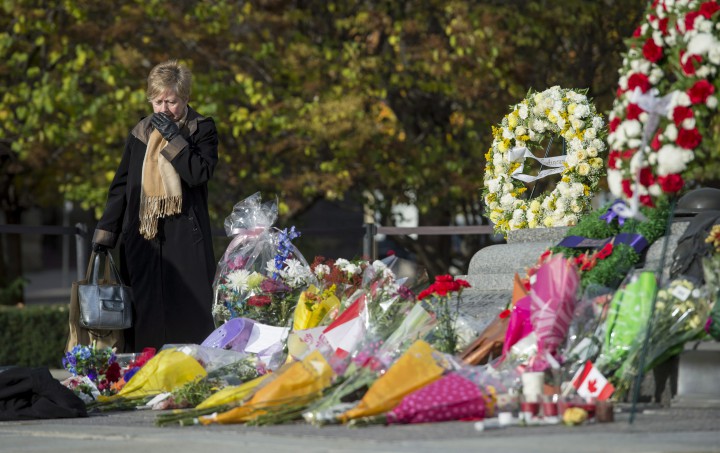OTTAWA – The gunmen who launched attacks in Ottawa, Paris and Copenhagen are all linked to the broader Islamist terrorist movement in Iraq and Syria, says the French ambassador to Canada.

That’s the case, argued Nicolas Chapuis, even if the attackers did not have any direct contact with the each other or the broader leadership of the Islamic State of Iraq and Syria, ISIS.
“The so-called lone wolves that we have witnessed in Ottawa, Paris, Copenhagen are all united by this ideology of destruction,” Chapuis said in a recent interview.
READ MORE: Zehaf-Bibeau video release triggers chilling memories
“This is linked — a very strong link. And we need to tackle the root of the problem.”
That underscores the need for countries such as Canada and France to co-ordinate their international and domestic efforts to fight terrorism, he said.
France and Canada are doing that as part of their shared contribution to the Western coalition fighting the ISIS advances in Iraq and Syria, and their joint efforts in battling their own homegrown terrorist threats.
Chapuis spoke before Friday’s revelation of the video made by Michael Zehaf Bibeau, the Oct. 22 Parliament Hill attacker, in which he allied himself to the global terrorist movement.
“I’m not commenting on Ottawa specifically. I’m just struck by the copycat between Paris and Copenhagen,” he said.
In both European attacks, the attackers targeted a venue of free expression as well as a distinctly Jewish target, he said.
- Honda expected to announce Ontario EV battery plant, part of a $15B investment
- Trudeau says ‘good luck’ to Saskatchewan premier in carbon price spat
- Canadians more likely to eat food past best-before date. What are the risks?
- Hundreds mourn 16-year-old Halifax homicide victim: ‘The youth are feeling it’
The January attack on the Charlie Hebdo newspaper in Paris was followed by one on a kosher supermarket, while last month’s shootings of two people in Denmark, started with an attack on a free expression lecture before moving on to a synagogue.
“Just join the dots,” said Chapuis, who lauded Foreign Affairs Minister Rob Nicholson for visiting the Grand Synagogue of Paris last week.
“After the terrorist attacks, there is a sense of solidarity and proximity between Canada and France.”
Chapuis also made another connection: between climate change and international security.
READ MORE: 7 unanswered questions about the Michael Zehaf Bibeau video
If the world can’t limit global warming to two degrees, he said, “we are going to face dramatic consequences, which involves food security, water security, habitat, and dislocations (which) will bring havoc in societies thus increasing domestic security issues.”
He said it is no coincidence that an al-Qaida-linked terrorist offshoot has grown strong across the Sahel region of Africa, where encroaching deserts are eating up farmland and uprooting large populations.
“Is climate change responsible for such and such conflict? No. But if you look for instance at the Sahel region in Africa, the desertification of Sahel increases poverty, which increases dislocation of societies,” said Chapuis. “So there’s a link, but more importantly is the direct link between climate and the natural conditions of our habitat.”
Chapuis had no comment on the Harper government’s decision to withdraw from the United Nations convention that is trying to combat desertification — the only county in the world to opt out. His predecessor, Philippe Zeller, questioned that decision in a previous interview.
France will host this year’s major United Nations climate change conference and is pushing for robust Canadian participation.
Chapuis said he’d like to see a firm greenhouse gas reduction commitment from Canada if not by an end-of-month deadline then by June.
The envoy said he’s confident that Canada will make a meaningful contribution, based on the conversation that took place when Prime Minister Stephen Harper hosted French President Francois Hollande in Ottawa in November.
“We need to keep this momentum strong so that skeptical parties, who are uneasy about climate change, find that it is in their interest to join the effort.”
Chapuis took aim at an argument that Harper has made in the past — that measures to bring down greenhouse gas emissions ought not to impede economic growth, particularly in Alberta’s carbon-generating oilsands.
“The fight against climate change should not be in any way opposed to economic growth because it is exactly the contrary,” said Chapuis.
“The cost of not acting is higher than the cost of acting,” he added.
“Since we have a government of Canada that is very attentive, concerned about costs, budget balance, deficit reductions, the government will have to compute the cost of acting and the cost of not acting.”



Comments